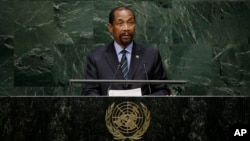Lesotho’s national general elections will be held at the end of February, two years earlier than planned. The announcement Thursday came after government coalition leaders signed an agreement meant to hold them to decisions made at talks to secure lasting peace in the mountainous kingdom.
South Africa's Deputy President Cyril Ramaphosa was named the regional facilitator to Lesotho last month, as the Southern African Development Community [SADC] strove to resolve the country’s political challenges following an attempted military coup on August 30.
Prime Minister Tom Thabane looked forlorn as Ramaphosa announced that the country’s parliament will reconvene on October 17.
“The sitting of the parliament will be limited to passing of a budget and to do all other related matters regarding the holding of early elections," said Ramaphosa. "National general elections will be held toward the end of February 2015 and on a date that would be determined by His Majesty the King … parliament, having been reconvened, will be dissolved at the beginning of December 2014 to prepare the country for the holding of general elections.”
Thabane presides over a coalition government -- the first of its kind in the country’s history, but one that was a product of political expediency in 2012 when elections failed to produce a clear winner.
Discord within the country’s tripartite coalition has been building rapidly since Mr. Thabane declared a 10-month suspension of parliament in June. The declaration came after the opposition tried to pass a motion of no-confidence that would see the prime minister ejected from power.
The attempt to seize power in August was spearheaded by the Lesotho Defense Force commander Tlali Kamoli, who has refused to step down despite being discharged by the president, and has been accused of coordinating attacks on police and political rivals.
Kamoli - who is reportedly surrounded by a group of armed loyalists - faces accusations of mutiny and treason, but remains at large.
Ramaphosa on Thursday carefully dodged questions about who is the current leader of the armed forces. South Africa’s deputy premier said that SADC will investigate a shootout between the police and army on Tuesday night, and appealed to the security forces to stop fighting.
“We want peace, amicable dealings between the army and the police. More importantly we would like to see the army and the police be de-politicized," said Ramaphosa. "We want armies in the region and in the continent to be de-politicized to serve the interests of the people and not to serve party political interests.”
“The kingdom in the sky,” with a population of 2 million, has suffered a series of coups since independence from Britain in 1966.
Long-term structural issues will have to be addressed in order to break the cycle of political volatility that continues to see power disputes during and after elections.




